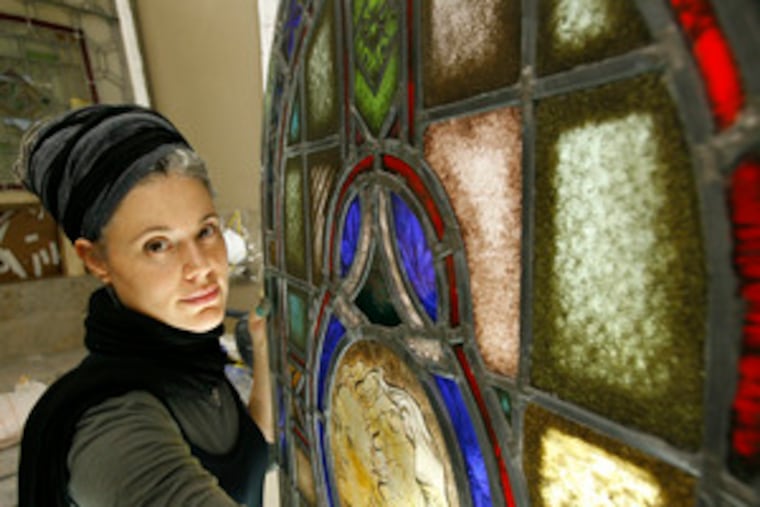Stained glass - almost a religious experience
Churches, not surprisingly, are frequent clients.

Emily Selvin has dealt with lots of pressure in her time as a custom stained-glass artisan, designer and restorer.
Since forming her Philadelphia studio, Selvin Glass, in 1999, she has trademarked her "Illuminated Tables," restored the RCA Victor dog in Camden, and appeared on the Home & Garden network. She's created artworks for private homes and made specialized pieces for high-profile clients such as Stephen Starr and Patti LaBelle.
But God is another matter.
No matter what the religion, everything is heightened when it comes to restoring the windows of a house of worship, she says.
"I'm aware of my work's importance and the impact it can have on the religious organization or the homeowner," says Selvin, 37.
It's a laborious process, restoring stained glass. So far, Selvin has tackled artifacts at the West Park Church at 40th and Chestnut Streets and St. Bridget Catholic Church on Midvale Avenue in East Falls, the church that Grace Kelly attended as a child.
"What Emily's doing is wonderful; part of the restoration of the craftsmen tradition that's currently in full swing," says Alvin Holm, a restorative architect who works with Selvin. "That tradition speaks to something beyond the self, beyond the individual."
Whether it's a sacred or a secular client, Selvin enjoys working in a craft she loves, one that marries Old World aesthetics with contemporary needs.
She grew up surrounded by arts and letters. Her grandfather, big-band leader Ben Selvin, sold millions of copies of "Yes! We Have No Bananas" and "Dardanella" before becoming a vice president at Muzak and 3M. Her mother and father, former Daily News writer Rick Selvin, collected glass, and she took up its study at the Pennsylvania Academy of the Fine Arts.
After starting work in glass in 1989, she found quickly how expensive a hobby it is - which is why she turned it into a business. Her experiments with light and clarity led not only to tables lit from within but also to enclosed glass books, where, without turning the pages, an entire story can be read.
Then came the stained glass. The first windows she did came accidentally after Bishop Geralyn Wolf of the Episcopal Diocese of Rhode Island appeared in front of Selvin's Old City loft, struggling with a piece of lumber. Selvin found Wolf a saw and mentioned that she was working on a painting for which she was using glass for the first time.
Wolf said, " 'Oh, you do stained glass?' " Selvin said. "I blatantly lied and said yes."
She quickly became an enthusiast for the medium. Stained glass, she says, provides privacy and comfort, yet when lit properly, it can shimmer and sparkle as no other reflective surface can.
Sculptor Carole Cole, one of Selvin's first residential clients, needed no sales pitch. Selvin concocted 20 glass elements for Cole's large front door in Bala Cynwyd, with no two alike.
"When you ring our doorbell, you can't help but be amazed by this glass," said Cole, who referred Selvin to friends. "It's completely in your face, yet it looks like it's always been in our house. She's good at encompassing the other person's tastes into her vision."
Selvin strives to make stained glass that is quiet. Her goal is to help foster an environment that is peaceful and meditative, to not compete with the surroundings in which her work is placed.
She especially enjoys doing private homes (Delancey Street houses are her favorite) and eateries like the former Blue Angel and Caribou Cafe. "The restaurants are always frenetic," says Selvin. "Things seem to be so dramatic. But it's easy to understand, as dining out is a bit of a theatrical experience."
Her ecclesiastical commissions touch upon different emotions. Selvin, who was raised Jewish, with comforting memories about practicing the religion, finds it funny that she's working for the Catholic Church now. "I've never been commissioned by a single synagogue," she said.
Her works include a series of West Park Church's windows that were fabricated in the 1800s; she restored six iconographic and 12 neo-Gothic/Victorian windows. On big jobs, she brings in as many as six people to help. Payment is based on the age of the glass, its value, and the extent of the damage - and everyone haggles.
"The clergy have large committees they have to work with," says Selvin. "Their job is to make their community happy. They have to maintain the history of the spaces they worship in."
That's a responsibility taken seriously by the Rev. John Kelly and the Rev. Joseph Devlin of St. Bridget, who hired Selvin to restore several windows. It's an expensive procedure - Devlin remembers the cost as upwards of $10,000 for each window.
"We see ourselves as stewards," Devlin said. "Not just to God. But to the fact past generations have handed down this beautiful church and all these beautiful, meaningful windows. It's important that we be good caretakers of these precious - and sacred - objects."
Though she's equally devoted to all her commissions, sacred and secular, Selvin considered working on St. Bridget's glass an "exquisite honor," as its depictions of saints and angels are nearly unequalled in the artistry of the original work. She admires her predecessors, the often nameless men and women who crafted the originals.
The church has returned the admiration: In early December, Selvin received another commission to restore several 20-foot second-story windows there.
"Every space is sacred in its own way," she said, "And therefore of equal integrity and value to me, both as a restorer and as a person who is empathetic of those who choose to lead a religious life."